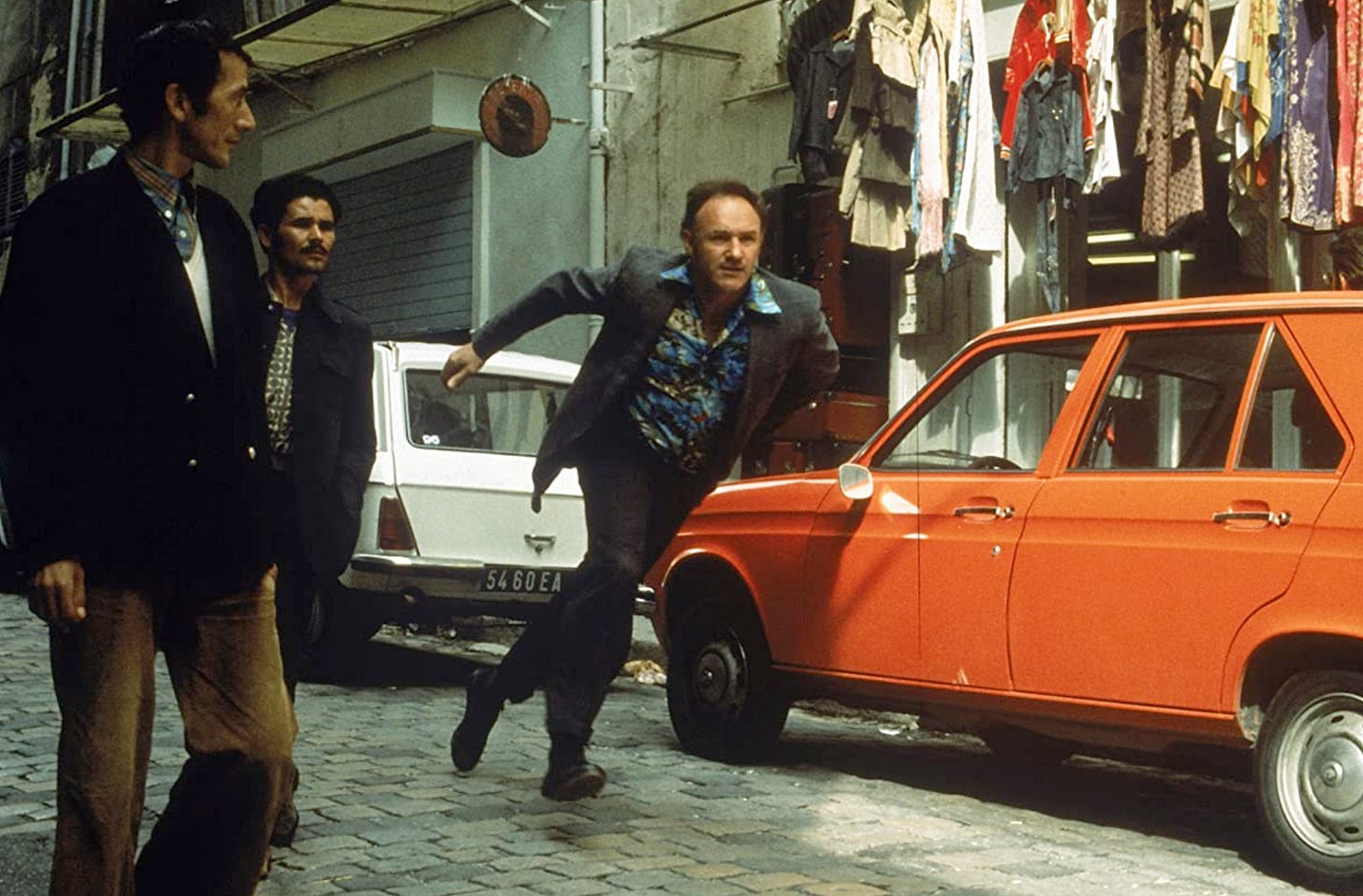Welcome to today’s plug, a quick recommendation of an oft-forgotten film, cult classic, or movie that is dying to be rewatched //
Hey hey, comin’ atcha with another double-feature plug, and today you’re getting two distinct sides of the great Gene Hackman, both from 1975. I’ve been on a bit of a ‘70s Hackman kick as of late. A couple weeks ago the internet was on a Hackman kick too when a recent photo of the now-reclusive 91-year-old actor went viral, again. Hackman retired from acting in 2004, and since then he’s lived in New Mexico, writing novels and chillin’ balls. More power to him. Anyway, I’ve always been a fan of Hackman’s shit and he’s firmly in the generation of actors (and filmmakers) I dig most, but I never really thought of him as one of my guys, at least not in the same way as Jack Nicholson or Elliot Gould or even Clint Eastwood (though as one of my Dad’s guys, Hackman loomed large in my house growing up). But watching these two bangers last month reminded me that he is, in fact, one of my guys.
If you haven’t seen William Friedkin’s seminal, grimy New Hollywood crime thriller The French Connection, get on that shit. It’s one of those great ‘70s dark character studies that I can’t seem to shut the fuck up about in this newsletter. Hackman made a name for himself and took home the Best Actor Oscar for his portrayal of violent, racist New York cop Jimmy “Popeye” Doyle. The film follows Doyle and partner Buddy Russo (Roy Schieder) as they chase after a drug smuggling ring with a connection to Marseilles, France. It’s a Bosch-like portrait of New York in the early ‘70s and a vivid slow-motion glance at the vicious, blunt futility of American policing. In her famously lauding review of the film, Pauline Kael called Popeye Doyle an “Existential hero” of the “modern big city as Inferno” on one hand, and “the anti-hero carried to a new lumpenprole low” on the other — “the mean cop who used to figure on the fringes of melodrama (as in Sweet Swell of Success) moved to the center.” The French Connection, Kael adds, “turns old clichés into new clichés by depriving the central figure of any attractive qualities.”
Hackman apparently had a super hard time playing this motherfucker (go figure) but you’d never know it from his performance. And you certainly wouldn’t know it from the dimensions he adds to the character in French Connection II. Directed by John Frankenheimer (The Manchurian Candidate, Ronin), this is one of those sequels that’s so goddamn unnecessary on paper that it’s a small miracle how good it is, ya know? Like yeah, the first one is objectively a “better” movie, but I think I prefer French Connection II because it a) is more, I dunno, satisfying as a popcorn action picture, and b) approaches the subject of white-guy rage and law enforcement in a different, illuminating context — placing Popeye in France on a futile quest to track down the drug smuggler who escaped his clutches in the first film.
In The French Connection, we only see Popeye Doyle in his element. Far away from his dark little corner of the world, Popeye’s badge means nothing, and neither does his brash, bullish front. He’s leveled, defenseless, and pitifully fragile (though Hackman is no less charismatic and fuckin’ dynamite to watch). There’s this whole act of the film where the action stops and the drug smugglers capture Doyle, forcefully get him hooked on heroin, then release him so he has to go through crippling withdrawals. While recovering he gives this incredible monologue about how as a young man he was in the minor leagues with Mickey Mantle and, in the face of budding greatness, ditched his baseball dreams to became a cop. It’s one of the most devastating, naked depictions of crumbling masculinity that I’ve ever seen or probably ever will see on screen.
And the final action setpiece that follows sort of encases the film in this tragically evergreen notion that a tiny bit of frontier justice meted out by one man’s rage is the default setting of modern policing, and the collateral damage is always extensive.
You can rent French Connection II on Amazon.
Switching gears (but only slightly), we come to Night Moves, an LA neo-noir in the vein of Robert Altman’s The Long Goodbye or, if you prefer, Paul Thomas Anderson’s hazy retro-hippy-hard-boiled-detective joint Inherent Vice. It popped up on The Criterion Channel’s Neo-Noir collection last month and (difficult moments of fucked-up sexual politics aside) I was happy to see how well it held up as a cool ‘70s genre piece. Hackman plays private eye Hank Moesby, who’s hired by an aging actress to track down her missing teenage daughter. The plot, as they say, thickens from there. @JFrankensteiner sums up what makes Night Moves (and Hackman’s performance) so effective in this tweet:

In other words, Moesby is no Popeye Doyle. He’s an old-fashioned feller, to be sure, but for the most part he’s very much a non-toxic masculine archetype. A brighter-than-average former football star-turned-benevolent P.I., Moesby isn’t really exceptional in any way (other than the absolute drip tho, seriously I’ll take the entire Hank Moesby wardrobe plz), he’s just a pretty decent guy in a perpetually indecent universe, which seems a lot closer to who Hackman is in real life, and about all I can hope to be as a red-blooded American dude just tryna make his way through this mad world without leavin’ a bootprint.

You can watch Night Moves on The Criterion Channel. You can also rent it on Amazon.
If you liked the post, please hit the heart button below // It helps us reach more readers on Substack // Also, tell a film-loving friend to subscribe //
Follow me on Twitter and Letterboxd // Read more of my writing: whoisandyandersen.com







